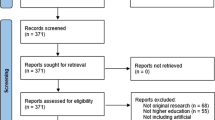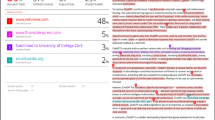Abstract
Recent research in ethics education shows a potentially problematic variation in content, curricular materials, and instruction. While ethics instruction is now widespread, studies have identified significant variation in both the goals and methods of ethics education, leaving researchers to conclude that many approaches may be inappropriately paired with goals that are unachievable. This paper speaks to these concerns by demonstrating the importance of aligning classroom-based assessments to clear ethical learning objectives in order to help students and instructors track their progress toward meeting those objectives. Two studies at two different universities demonstrate the usefulness of classroom-based, formative assessments for improving the quality of students’ case responses in computational modeling and research ethics.
Similar content being viewed by others
References
Angelo, T. A., & Cross, P. (1993). Classroom assessment techniques (2nd ed.). San Francisco, CA: Josey Bass.
Bebeau, M. J., & Thoma, S. (1999). Intermediate concepts and the connection to moral education. Educational Psychology Review, 11(4), 343–360.
Black, P., & Wiliam, D. (1998). Inside the black box: Raising standards through classroom assessment. Phi Delta Kappan, 80(2), 139–148.
Bransford, J. D., Brown, A. L., & Cocking, R. R. (Eds.). (2008). How people learn: Brain, mind, experience, and school. Washington, DC: National Academy Press.
Davis, M., & Feinerman, A. (2010). Assessing graduate student progress in engineering ethics. Science and Engineering Ethics, 18(2), 351–367.
DuBois, J. M., Schilling, D. A., Heitman, E., Steneck, N. H., & Kon, A. A. (2010). Instruction in the responsible conduct of research: An inventory of programs and materials within CTSAs. Clinical and Translational Science, 3(3), 109–111.
Harris, C. E., Pritchard, M. S., & Rabins, M. J. (1995). Engineering ethics: Concepts and cases (4th ed.). Belmont CA: Wadsworth.
Kalichman, M. (2007). Responding to challenges in educating for the responsible conduct of research. Academic Medicine, 82(9), 870–875.
Kalichman, M., & Plemmons, D. (2007). Reported goals for responsible conduct of research courses. Academic Medicine, 82(9), 846–852.
Keefer, M. W., & Ashley, K. D. (2001). Case-based approaches to professional ethics: A systematic comparison of students’ and ethicists’ moral reasoning. The Journal of Moral Education, 30(4), 377–398.
Keefer, M. W., & Davis, M. (2012). Curricular design and assessment in professional ethics education: Some practical advice. Teaching Ethics, 13(1), 81–90.
Keefer, M. W., & Wilson, S. (2011). Responding to computational modeling cases: The importance of informal assessment. Paper presented at the 13th international conference for the society for ethics Across the Curriculum. St. Louis, MO. November, 3–5.
Kijowski, D. J. (2010). Responsible conduct of research with computational models and simulations. Illinois Digital Environment for Access to Learning and Scholarship (IDEALS), p. 237. Retrieved May 25, 2011, from https://www.ideals.illinois.edu/handle/2142/18349.
Kijowski, D.J., Dankowicz, H., & Loui, M. C. (2011) Observations on the responsible development and use of computational models and simulations. Science and Engineering Ethics. To appear, available online, doi:10.1007/s11948-011-9291-1.
Lehmann, L. S., Kasoff, W. S., Koch, P., & Federman, D. D. (2004). A survey of medical ethics education at U.S. and canadian medical schools. Academic Medicine, 79(7), 682–689.
Loui, M. C. (2006). Assessment of an engineering ethics video: Incident at morales. Journal of Engineering Education, 95(1), 85–91.
Resnick, L. B. (1987). Learning in school and out. Educational Researcher, 16(9), 13–20.
Stevens, D. D., & Levi, A. J. (2013). Introduction to Rubics (2nd ed.). Sterling, Va: Stylus Publishing.
Acknowledgments
This work was supported by the National Science Foundation under grants IIS-0832843 and IIS-0832844. Any opinions, findings, and conclusions or recommendations expressed in this material are those of the authors and do not necessarily reflect the views of the National Science Foundation. We would like to thank Nicole Cooley for help with data coding; Ying Liu and Natalie Bolton for data analysis; and David Kijowski for his help in developing the case studies that were tested in these two studies.
Author information
Authors and Affiliations
Corresponding author
Rights and permissions
About this article
Cite this article
Keefer, M.W., Wilson, S.E., Dankowicz, H. et al. The Importance of Formative Assessment in Science and Engineering Ethics Education: Some Evidence and Practical Advice. Sci Eng Ethics 20, 249–260 (2014). https://doi.org/10.1007/s11948-013-9428-5
Received:
Accepted:
Published:
Issue Date:
DOI: https://doi.org/10.1007/s11948-013-9428-5




